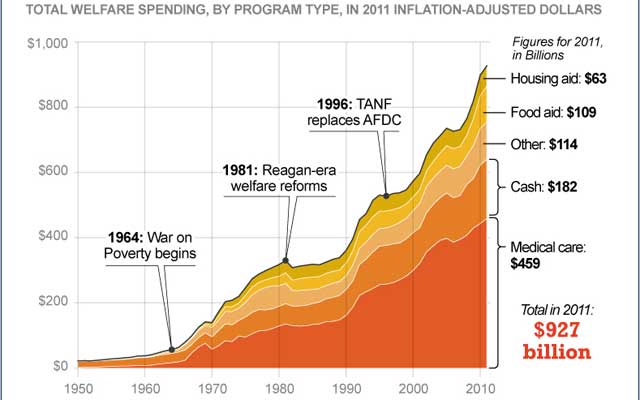Family Fact of the Week: Stagnant Poverty Numbers Signal Need for Change
Collette Caprara /
The number of people in poverty in America stagnated in 2012, according to a recent report by the U.S. Census Bureau.
This comes as no surprise. Since the government launched its War on Poverty 50 years ago—and has now poured nearly $20 trillion into a massive welfare system—poverty numbers have barely budged.
In contrast with the welfare system’s failure to empower individuals and families to rise from poverty, grassroots leaders in low-income neighborhoods throughout the country have achieved notable success in helping people move upward toward self-sufficiency. These men and women work with shoestring budgets but have firsthand knowledge of the problems they address and an impassioned commitment to make a difference. Their approach differs substantially from the government’s conventional approach and can provide guidelines for ways in which the nation’s welfare system can be reformed to truly make a difference in the lives of the people it serves.
A key element of community-based outreach is promoting marriage and strengthening families. Promoting marriage and healthy relationships is crucial to uplift from poverty for numerous reasons. Many of the cases of entrenched poverty in America stem from broken relationships.
Most long-term poverty occurs in single-parent homes. Sadly, today over 40 percent of children are born to single mothers. However, marriage reduces the probability that a child will be in poverty by 82 percent. Marital status is linked to financial well-being and brings a higher likelihood of financial success for men as well as women. Married men tend to have greater earnings, and married couples are more likely to own a home, accumulate savings, and attain affluence.
Strong and stable families also contribute to the physical and mental health of men and women and protect children against risk behaviors that can hinder their ability to thrive as adults. Research shows that living in an intact family reduces the likelihood that youth will engage in substance abuse or early sexual activity, improves their psychological and emotional health, and enhances their prospects for accomplishing higher levels of academic achievement and educational attainment.
Also, in contrast to the approach of the failed welfare system, effective grassroots outreach to the poor typically entails the notions of personal responsibility and reciprocity through work. This notion of reciprocity is key to helping individuals rise from dependency. It often entails practical advantages such as job training and placement through community partnerships or on-site businesses, and it contributes to the self-worth and dignity of those striving to rise from poverty.
The strategies and goals of the government’s welfare system need reform. Government policy should take its cue from those who are effectively addressing the problems of poverty. It should establish meaningful work requirements to promote personal responsibility and include initiatives to encourage marriage and strengthen families.

